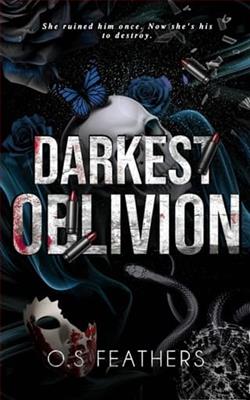Page 30 of Captive Virgin of the Bratva
She rises, slow and stiff. I catch the way she favors her right side—either the floor’s gotten to her or she didn’t sleep last night. Or both. But she doesn’t complain. Doesn’t offer me a single word as I lead her down the narrow hallway, out through the back door, and into the cold morning light.
The air bites, sharp and clean, carrying the scent of pine and frost. The sky is a pale, cloudless stretch overhead, and the world beyond the farmhouse is quiet. Empty.
She stands there, eyes closed for a second too long, like the air itself might vanish if she opens them too soon. Her chest rises, slow and deliberate. When she exhales, there’s steam on her breath.
It’s the first time I’ve seen her outside since we took her.
She’s thinner than I remember. The oversized scrubs hang off her frame now, sleeves bunched at the wrists, pants loose at the hips. Her hair’s a mess—wild curls falling from what’s left of a ponytail, a few strands stuck to her lips from the wind. There’s dirt on her knees, a smudge on her jaw, dried blood at the edge of one sleeve she hasn’t noticed or doesn’t care to clean.
She still looks like she could bite through bone if I got too close.
I stand beside her, watching her take it in.
“This doesn’t make you a decent person,” she says suddenly, not looking at me.
I grunt. “You’ll be useless if you lose your mind.”
She turns her head, glancing at me through narrowed eyes. “That why I’m here? To be ‘useful’?”
I shrug. “Why else?”
She scoffs and turns her face back to the wind, eyes on the trees. “Do you ever stop being an asshole, or is it just a full-time job?”
Something in me twitches. Not quite laughter but close.
My lips pull—half an inch, maybe less. It’s not a smile. Not really, but it’s the closest I’ve come in a long time.
“Only when I’m asleep,” I say.
She snorts under her breath, folding her arms across her chest. “Figures.”
I walk away before I say something I’ll regret. Before I stay too long looking at her like this—free for a moment, but still within my reach. Still mine.
I don’t look back, but I know she’s still standing there.
I feel it—like gravity. Like heat. Like the way silence can thicken when someone’s watching you too closely.
My boots crunch across the frozen ground, gravel and frost snapping under the weight of each step. There’s no sound except the wind threading through the trees, the occasional groan of the old barn somewhere behind us, and the faint rustle of her sleeves when she folds her arms tighter around herself.
She doesn’t follow right away. That, I expect. Elise doesn’t do anything the easy way.
I stop near the fence that borders the edge of the clearing. Beyond it, the woods stretch dark and endless. No paths. No lights. No hope of escape unless you know where to put your feet and how not to freeze by sundown. She must know that too. That there’s nowhere to run. Yet I can feel her sizing it up.
She walks up behind me eventually, quiet as a breath, her shoes scuffing lightly in the dirt. Still barefoot in those paper-thin hospital socks we gave her. She hasn’t asked for shoes. Hasn’t asked for anything.
She’s too proud for that.
I let the silence stretch between us for a long moment. Then I say, “If you try to run, you won’t get far.”
“I know.”
Her voice is low. Flat. Not afraid, not angry—just… tired.
I glance at her from the corner of my eye. She’s staring out over the tree line like she wants to memorize every branch, every angle, in case it might matter later. That kind of mind—always calculating, always watching. She doesn’t have a gun or a plan or a prayer out here, but she still thinks like a survivor.
That’s dangerous. That’swhyshe’s dangerous.
“Why haven’t you killed me yet?” The question comes without warning.















